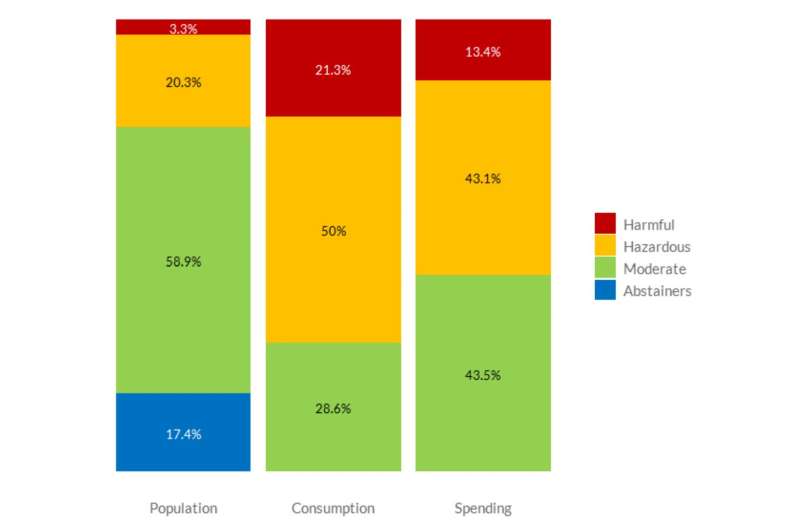This article has been reviewed according to Science X's editorial process and policies. Editors have highlighted the following attributes while ensuring the content's credibility:
fact-checked
trusted source
proofread
Inflation and the COVID-19 pandemic have eroded the effectiveness of Minimum Unit Pricing for alcohol in Scotland

Inflation and the COVID-19 pandemic have eroded the effectiveness of Minimum Unit Pricing (MUP) for alcohol in Scotland, a new report from the University of Sheffield has found.
Researchers from the Sheffield Alcohol Research Group (SARG) found the Minimum Unit Price, which was set at 50p per unit when it was introduced by the Scottish Government in May 2018, is now equivalent to 41p per unit after adjusting for the effects of subsequent inflation.
Since it was introduced in Scotland in 2018, MUP has been linked to an estimated three percent reduction in alcohol consumption, a 4.1 percent reduction in hospital admissions and a 13.4 percent reduction in deaths directly caused by alcohol.
Although MUP has been linked to a number of positive health impacts in Scotland, Sheffield researchers believe an increase in the MUP level is now needed to maintain these positive impacts, and failing to link MUP to rising inflation will cost more lives in the future.
Colin Angus, Senior Research Fellow at the University of Sheffield's Centre for Health and Related Research, said, "We now have the evidence to demonstrate that MUP has worked to reduce alcohol harm, but high inflation means 50p per unit in 2023 is considerably less effective than 50p was when MUP was first introduced in Scotland five years ago."
"Our new analysis suggests that alcohol consumption is 2.2 percent higher than it would have been if the MUP level had risen in line with inflation since it was introduced."
He added, "Failing to link the MUP level to inflation means that the level would need to rise from 50p to 61p just to maintain the same effectiveness at reducing harm. Consideration should also be given to the effects of inflation in the future to ensure that the positive impacts of the policy are not eroded over time."
"Maintaining an effective MUP level is even more important since the pandemic, during which we saw an increase in the alcohol consumption of heavier drinkers and a corresponding rise in alcohol-specific deaths."
The report presents new analysis showing that people in Scotland drinking within the UK low-risk guidelines of 14 units per week, who make up over three quarters of the adult population, reduced their alcohol consumption during the pandemic on average. However, people drinking over the guidelines pre-pandemic increased their drinking in 2020.
New modeling finds that even if alcohol consumption returns to pre-pandemic levels in 2023, an estimated 663 more people will die and there will be 8,653 additional hospital admissions linked to alcohol, costing the NHS £10.9 million, by 2040.
Under more pessimistic assumptions where alcohol consumption remains at pandemic levels in the longer term, these estimates increase substantially to 7,924 additional deaths and 91,332 hospital admissions, costing £111.2 million.
Colin Angus added, "Increased levels of alcohol-attributable harm are yet another way in which the COVID-19 pandemic continues to cast a long shadow on the health of the Scottish public. Even under optimistic assumptions about how long the increases in the drinking of heavier drinkers that we have seen during the pandemic might persist, the long-term effects of these increases are likely to cancel out some of the beneficial impacts of MUP."
The Sheffield report also estimated the effectiveness of the new alcohol duty reforms implemented by the Government on 1 August this year.
Results showed the alcohol duty reform, which has seen changes to the way in which taxes are levied on wine and cider in particular, is estimated to lead to a small (0.4 percent) reduction in population alcohol consumption in Scotland.
"We estimate that the recent reforms to alcohol duty will have a small positive impact on health in Scotland," said Colin Angus.
"Our new report estimates that the reforms will lead to 220 fewer deaths over 20 years. This figure is around 10 times smaller than the estimated impact of raising the MUP level by 10p (2,483 fewer deaths).
More information: Report: sarg-sheffield.ac.uk/wp-conten … -mup-report-2023.pdf




















